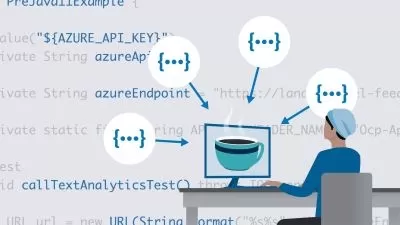Acing the Java Interview: Top Java Interview Questions
Ahmed Elsakka
1:31:34
Description
Java Basics, JVM, Strings, OOP, Multithreading, Collections, Object Oriented Design and Data Structures
What You'll Learn?
- Practical insights into Java interview questions
- Comprehensive understanding of Java basics, including JVM, JDK, and JRE.
- Mastery of Object-Oriented Programming (OOP) in Java, covering method overloading, inheritance, and more.
- In-depth knowledge of Java Generics and effective usage in applications.
- Thorough understanding of Java Strings and their underlying mechanics, such as immutability and the String pool.
- Advanced proficiency in Java Collections, including HashMap, Iterator, and differences between collections.
- Detailed concepts in Java Multithreading and Concurrency, including synchronization, deadlocks, and the volatile keyword.
- Effective handling of Java Exceptions, with a breakdown of checked and unchecked exceptions.
- Essential Java Data Structures knowledge for problem-solving in interview scenarios.
- How to ace Object Oriented Design interviews
Who is this for?
What You Need to Know?
More details
DescriptionDo you have a Java interview and want to brush up your Java knowledge and skills ? This course is the right choice for you to prepare for Java coding interviews with confidence!
In this course we will dive deep into essential and frequent Java interview questions covered in technical interviews, from basic Java fundamentals to advanced concepts in data structures, OOP principles, and multithreading.
What will students learn in your course?
Comprehensive understanding of Java basics, including JVM, JDK, and JRE.
Mastery of Object-Oriented Programming (OOP) in Java, covering method overloading, inheritance, and more.
In-depth knowledge of Java Generics and effective usage in applications.
Thorough understanding of Java Strings and their underlying mechanics, such as immutability and the String pool.
Advanced proficiency in Java Collections, including HashMap, Iterator, and differences between collections.
Detailed concepts in Java Multithreading and Concurrency, including synchronization, deadlocks, and the volatile keyword.
Effective handling of Java Exceptions, with a breakdown of checked and unchecked exceptions.
Essential Java Data Structures knowledge for problem-solving in interview scenarios.
Practical insights into coding interview questions, focusing on Java-based solutions.
How to ace Object Oriented Design interviews
.What are the requirements or prerequisites for taking your course?
Basic knowledge of programming fundamentals.
Familiarity with core Java syntax is helpful but not mandatory, as foundational topics will be covered.
No prior interview experience is required; this course is designed for students preparing for Java coding interviews of all levels.
Who is this course for?
Java developers preparing for technical interviews.
Junior and mid-level developers looking to strengthen their core Java knowledge and improve interview performance.
Computer science students or career changers aiming to build a solid foundation in Java.
Anyone wanting a comprehensive Java refresher to tackle technical interviews with confidence.
The course covers the following topics:
Java Basics
What is Java?
Java vs C++
What is JVM?
What is the Difference Between JDK, JRE, and JVM?
How Many Types of Memory Areas are Allocated by JVM?
What are the Advantages of Packages in Java?
Does Java Pass Variables by Value or Reference?
What is Method Overloading and Method Overriding?
What is the Difference Between == and .equals() in Java?
How Does Java Handle Multiple Inheritance?
What is the Diamond Problem?
What is Constructor Chaining in Java?
Default Constructors in Java
What is an Abstract Class?
What is a Final Class?
What is an Interface in Java?
What are Generics in Java?
What are Generic Methods?
What are Wildcards?
Why are Strings Immutable in Java?
What is the String Pool?
What is the Difference Between StringBuffer and StringBuilder?
Explain substring() Method. Does it Create a New String?
What is the Collections Framework in Java?
What is the Difference Between Iterator and Iterable Interfaces?
What is the Difference Between Hashtable and HashMap?
What is the Difference Between a Process and a Thread?
What is Synchronized in Java?
What is a Deadlock?
What is Starvation?
What is a Thread Safe Class?
Mutex vs Semaphore
Explain the "volatile" Keyword in Java
What is the wait() method in Java?
What is the notify() method in Java?
What is an Exception?
What Does Throwing an Exception Mean?
What are Checked Exceptions?
What are Unchecked Exceptions?
What are Runtime Exceptions?
How to Handle Multiple Exceptions in the Same Catch Block?
Java Object Oriented Design
Stack - Valid Parentheses
Set - School Database
Priority Queue - Kth Largest Element
Hash Map - Web Page Cache
So what are you waiting for ? do you want to ace your Java coding interview ? enroll in the course now and prepare for acing your Java interview in the quickest way possible with 30 days money back guarantee.
See you in the course! :)
Who this course is for:
- Java developers preparing for technical interviews.
- Junior and mid-level developers looking to strengthen their core Java knowledge and improve interview performance.
- Computer science students or career changers aiming to build a solid foundation in Java.
- Anyone wanting a comprehensive Java refresher to tackle technical interviews with confidence.
Do you have a Java interview and want to brush up your Java knowledge and skills ? This course is the right choice for you to prepare for Java coding interviews with confidence!
In this course we will dive deep into essential and frequent Java interview questions covered in technical interviews, from basic Java fundamentals to advanced concepts in data structures, OOP principles, and multithreading.
What will students learn in your course?
Comprehensive understanding of Java basics, including JVM, JDK, and JRE.
Mastery of Object-Oriented Programming (OOP) in Java, covering method overloading, inheritance, and more.
In-depth knowledge of Java Generics and effective usage in applications.
Thorough understanding of Java Strings and their underlying mechanics, such as immutability and the String pool.
Advanced proficiency in Java Collections, including HashMap, Iterator, and differences between collections.
Detailed concepts in Java Multithreading and Concurrency, including synchronization, deadlocks, and the volatile keyword.
Effective handling of Java Exceptions, with a breakdown of checked and unchecked exceptions.
Essential Java Data Structures knowledge for problem-solving in interview scenarios.
Practical insights into coding interview questions, focusing on Java-based solutions.
How to ace Object Oriented Design interviews
.What are the requirements or prerequisites for taking your course?
Basic knowledge of programming fundamentals.
Familiarity with core Java syntax is helpful but not mandatory, as foundational topics will be covered.
No prior interview experience is required; this course is designed for students preparing for Java coding interviews of all levels.
Who is this course for?
Java developers preparing for technical interviews.
Junior and mid-level developers looking to strengthen their core Java knowledge and improve interview performance.
Computer science students or career changers aiming to build a solid foundation in Java.
Anyone wanting a comprehensive Java refresher to tackle technical interviews with confidence.
The course covers the following topics:
Java Basics
What is Java?
Java vs C++
What is JVM?
What is the Difference Between JDK, JRE, and JVM?
How Many Types of Memory Areas are Allocated by JVM?
What are the Advantages of Packages in Java?
Does Java Pass Variables by Value or Reference?
What is Method Overloading and Method Overriding?
What is the Difference Between == and .equals() in Java?
How Does Java Handle Multiple Inheritance?
What is the Diamond Problem?
What is Constructor Chaining in Java?
Default Constructors in Java
What is an Abstract Class?
What is a Final Class?
What is an Interface in Java?
What are Generics in Java?
What are Generic Methods?
What are Wildcards?
Why are Strings Immutable in Java?
What is the String Pool?
What is the Difference Between StringBuffer and StringBuilder?
Explain substring() Method. Does it Create a New String?
What is the Collections Framework in Java?
What is the Difference Between Iterator and Iterable Interfaces?
What is the Difference Between Hashtable and HashMap?
What is the Difference Between a Process and a Thread?
What is Synchronized in Java?
What is a Deadlock?
What is Starvation?
What is a Thread Safe Class?
Mutex vs Semaphore
Explain the "volatile" Keyword in Java
What is the wait() method in Java?
What is the notify() method in Java?
What is an Exception?
What Does Throwing an Exception Mean?
What are Checked Exceptions?
What are Unchecked Exceptions?
What are Runtime Exceptions?
How to Handle Multiple Exceptions in the Same Catch Block?
Java Object Oriented Design
Stack - Valid Parentheses
Set - School Database
Priority Queue - Kth Largest Element
Hash Map - Web Page Cache
So what are you waiting for ? do you want to ace your Java coding interview ? enroll in the course now and prepare for acing your Java interview in the quickest way possible with 30 days money back guarantee.
See you in the course! :)
Who this course is for:
- Java developers preparing for technical interviews.
- Junior and mid-level developers looking to strengthen their core Java knowledge and improve interview performance.
- Computer science students or career changers aiming to build a solid foundation in Java.
- Anyone wanting a comprehensive Java refresher to tackle technical interviews with confidence.
User Reviews
Rating
Ahmed Elsakka
Instructor's Courses
Udemy
View courses Udemy- language english
- Training sessions 45
- duration 1:31:34
- Release Date 2025/02/25











